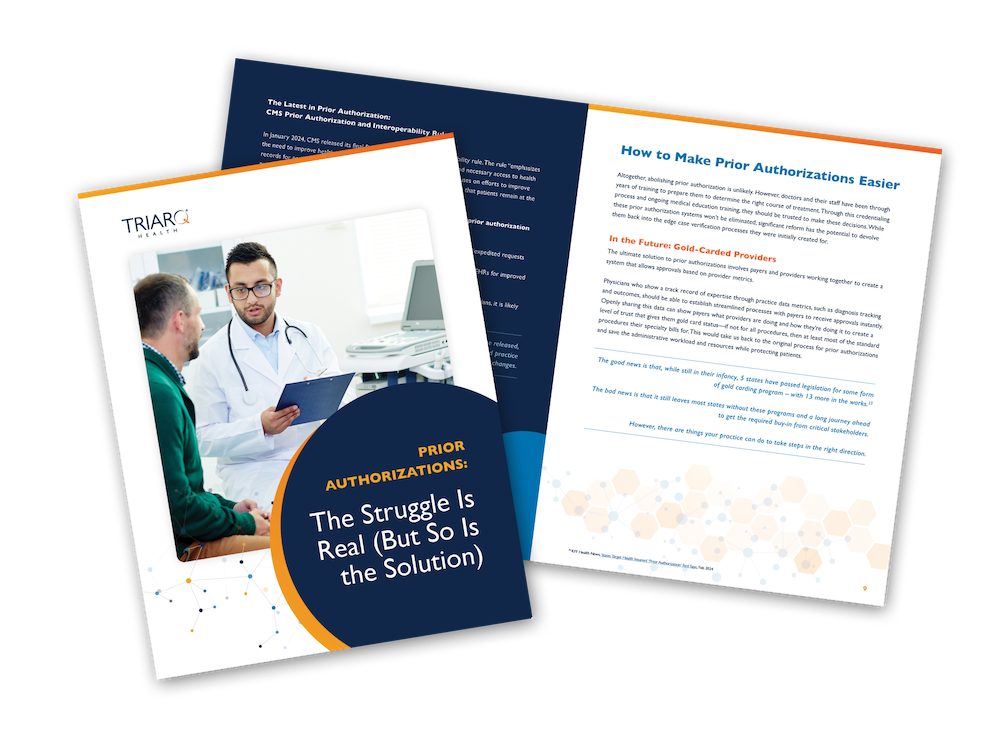As the healthcare landscape continues to evolve, the role of the Prior Authorization Specialist is expected to undergo significant changes. These professionals are vital in ensuring that medical treatments, medications, and procedures receive the necessary approvals from insurance providers, streamlining care for patients while managing healthcare costs. However, with the rise of technology, regulatory changes, and an increased focus on patient-centered care, the future of this profession is rapidly shifting.
This article will explore the future of the Prior Authorization Specialist profession, examining the emerging trends, the impact of technological advancements, changes in healthcare policies, and how these factors are likely to shape the role in the coming years.
- The Rise of Automation and Artificial Intelligence
One of the most notable changes on the horizon for Prior Authorization Specialists is the increasing integration of automation and artificial intelligence (AI) into the prior authorization process. AI and automation are already transforming healthcare workflows, and their influence is only set to grow in the future.
Automating Routine Tasks
AI-powered tools can automate many routine tasks that currently consume a significant portion of a Prior Authorization Specialist’s time. These tasks include verifying insurance coverage, collecting patient data, and filling out forms. Automated systems can quickly gather and verify the required information, submit authorization requests, and monitor the status of these requests in real-time.
AI for Decision-Making
Artificial intelligence can go beyond simple automation by analyzing complex datasets and assisting with decision-making. For instance, AI algorithms can evaluate medical records and determine whether a procedure or treatment meets the criteria for approval. This speeds up the authorization process and reduces the number of denials, leading to more efficient patient care.
The Impact on the Role of Specialists
As AI takes over routine tasks, the role of the Prior Authorization Specialist is expected to shift toward more complex and specialized duties. Specialists will need to focus on handling difficult cases, managing appeals, and ensuring compliance with ever-changing healthcare regulations. Additionally, they will likely need to develop new skills to work alongside AI systems, interpreting the data and insights provided by these advanced tools.
- Increased Focus on Patient-Centered Care
In recent years, healthcare has increasingly shifted toward a more patient-centered approach, focusing on improving patient outcomes and experiences. This shift will likely continue to influence the Prior Authorization Specialist profession, as specialists will need to balance administrative tasks with ensuring that patients receive timely, necessary care.
Streamlining Processes for Patients
One of the main criticisms of the prior authorization process is that it can delay access to critical treatments, leading to frustration and potentially worsening health outcomes for patients. In response, healthcare organizations are seeking ways to streamline the process and reduce these delays. Prior Authorization Specialists will play a crucial role in making this happen by advocating for patients, ensuring that authorizations are processed quickly, and working closely with healthcare providers to avoid unnecessary delays.
Improving Communication with Patients
As the healthcare system becomes more patient-focused, Prior Authorization Specialists will likely need to enhance their communication with patients. Patients may not always understand the complexities of the prior authorization process, and specialists will be expected to provide clear, compassionate explanations about the status of their requests. This improved communication can help ease patient anxiety and improve their overall experience.
- Evolving Healthcare Policies and Regulations
The regulatory landscape in healthcare is constantly changing, with new policies and regulations affecting how prior authorizations are handled. These changes can have a significant impact on the Prior Authorization Specialist profession, requiring specialists to stay informed and adapt their practices accordingly.
Regulatory Changes Impacting Prior Authorization
In recent years, there has been increased scrutiny on the prior authorization process, with lawmakers and healthcare advocates calling for reforms to reduce the burden on healthcare providers and patients. Some states have passed legislation aimed at simplifying the process, while federal initiatives like the “Improving Seniors’ Timely Access to Care Act” seek to streamline prior authorization in Medicare Advantage plans.
Staying Compliant with Changing Laws
As healthcare regulations continue to evolve, Prior Authorization Specialists will need to stay informed about changes that impact their work. This may require additional training and continuous professional development to ensure that specialists understand new policies and can implement them effectively. Specialists who can quickly adapt to regulatory changes will be in high demand as healthcare organizations seek to maintain compliance while providing efficient care.
The Future of Compliance and Security
In addition to staying updated on healthcare policies, Prior Authorization Specialists will need to remain vigilant about data security and compliance with regulations such as HIPAA (Health Insurance Portability and Accountability Act). With the increasing use of digital tools and electronic health records, ensuring that patient data is handled securely and in compliance with privacy laws will continue to be a top priority for specialists.
- Telehealth and Remote Work
The COVID-19 pandemic accelerated the adoption of telehealth and remote work across many sectors of healthcare, including the prior authorization process. As telehealth becomes more widely accepted and healthcare organizations continue to offer remote work options, the role of the Prior Authorization Specialist will likely adapt to these trends.
The Growth of Telehealth
Telehealth has expanded access to healthcare, allowing patients to consult with providers from the comfort of their homes. However, telehealth services still require prior authorization in many cases, particularly for certain procedures and treatments. Prior Authorization Specialists will need to navigate the unique challenges posed by telehealth, such as verifying insurance coverage for virtual visits and ensuring that remote treatments meet the criteria for approval.
Remote Work for Specialists
The adoption of telehealth and other digital tools has opened the door for Prior Authorization Specialists to work remotely. Remote work offers increased flexibility for specialists, allowing them to perform their duties from anywhere with an internet connection. As more healthcare organizations embrace remote work, specialists will need to become proficient in using cloud-based platforms, secure communication tools, and remote collaboration software to perform their jobs effectively.
- The Role of Data Analytics
The future of the Prior Authorization Specialist profession will also be shaped by the growing importance of data analytics. As healthcare organizations collect more data than ever before, specialists will need to use this information to make better decisions, improve efficiency, and optimize the prior authorization process.
Leveraging Data for Better Decision-Making
Data analytics can provide valuable insights into the prior authorization process, helping specialists identify patterns and trends that can inform their decision-making. For example, by analyzing data on denied requests, specialists can identify common reasons for denials and take steps to address these issues proactively. This data-driven approach can improve approval rates and reduce the number of appeals.
Predictive Analytics for Authorization Requests
Predictive analytics is another powerful tool that can help Prior Authorization Specialists work more efficiently. By analyzing historical data, predictive algorithms can forecast the likelihood of a request being approved or denied, allowing specialists to prioritize high-risk cases and ensure that all necessary documentation is submitted. This can lead to faster approvals and fewer delays in patient care.
- Enhanced Collaboration with Healthcare Providers
In the future, collaboration between Prior Authorization Specialists and healthcare providers is likely to become even more critical. As the role evolves, specialists will need to work closely with physicians, nurses, and other healthcare professionals to ensure that the necessary treatments are authorized quickly and efficiently.
Integrated Healthcare Teams
The trend toward integrated healthcare teams, where professionals from various disciplines work together to provide coordinated care, will likely continue to shape the role of the Prior Authorization Specialist. Specialists will need to collaborate effectively with these teams to ensure that authorization requests are handled in a timely manner and that any potential issues are addressed before they lead to delays in patient care.
Streamlined Communication with Providers
Improving communication between Prior Authorization Specialists and healthcare providers will be essential for streamlining the authorization process. Technology will play a crucial role in facilitating this communication, with secure messaging platforms and integrated electronic health record systems allowing specialists and providers to exchange information quickly and securely.
- Continuous Professional Development
As the healthcare industry evolves, Prior Authorization Specialists will need to engage in continuous professional development to stay current with emerging trends, technologies, and regulations. Lifelong learning will be essential for specialists who want to remain competitive in a rapidly changing field.
Expanding Skill Sets
In the future, Prior Authorization Specialists will need to expand their skill sets to include expertise in new technologies such as AI, data analytics, and telehealth platforms. In addition, specialists will need to stay informed about evolving healthcare policies and regulations, ensuring that they remain compliant with the latest requirements.
Certifications and Continuing Education
Continuing education and certifications will become increasingly important for Prior Authorization Specialists who want to advance in their careers. Professional organizations, such as the National Association of Healthcare Access Management (NAHAM), offer certifications that validate a specialist’s expertise in healthcare access management and prior authorization. Earning these certifications can enhance a specialist’s credentials and open up new career opportunities.
- The Human Element: Empathy and Advocacy
Despite the rise of automation and AI, the human element will remain a vital aspect of the Prior Authorization Specialist profession. Specialists will continue to serve as patient advocates, ensuring that patients receive the treatments they need without unnecessary delays or denials.
The Role of Empathy in Patient Care
As healthcare becomes more patient-centered, empathy and advocacy will be increasingly important for Prior Authorization Specialists. Specialists will need to balance the administrative requirements of the authorization process with the emotional needs of patients, many of whom are dealing with stressful or complex medical conditions. Clear communication, compassion, and a patient-first mindset will be key to providing high-quality care.
Advocating for Timely Care
Advocating for patients will continue to be a core responsibility of Prior Authorization Specialists. Specialists must work diligently to ensure that insurance companies approve necessary treatments in a timely manner, reducing delays in care and improving patient outcomes. As the healthcare landscape becomes more complex, specialists will need to navigate these challenges while keeping the patient’s best interests at heart.
Conclusion
The future of the Prior Authorization Specialist profession is bright, with technology, policy changes, and evolving patient care models driving the field forward. While automation and AI will transform many aspects of the role, the human element—empathy, communication, and patient advocacy—will remain essential. As the role evolves, continuous professional development and a focus on improving patient outcomes will be key to staying competitive and excelling in this critical field. To learn more about how technology can enhance the work of Prior Authorization Specialists, visit DocVA.






